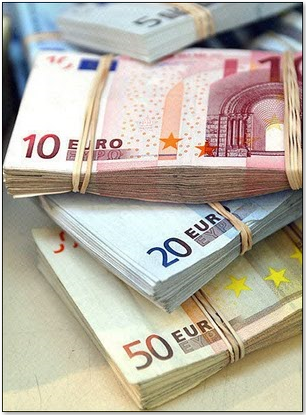 |
To understand just how political currency markets have become, one needs to only look at the euro. Indeed, the currency is enjoying some of the best economic growth in years, yet remains mired within a few pennies of multi-decade lows.
Last night, EUR/USD broke through the 1.0600 barrier and kept falling all the way through the 1.0550 level in essentially a one-way trade today despite flash PMI readings from the region coming in better than expected.
In Germany, both PMIs showed an improvement with manufacturing rising to 57 from 56.2, while services increased to 54.4 versus 53.6. In France, the data was more mixed with manufacturing declining but services rising. Overall, the PMI Composite data from the region stood at 56.0 versus 54.3, comfortably above the 50 boom/bust level and its best reading in more than seven years.
|
|
| Politics has undermined faith in the euro despite positive economic data from Europe. |
PMI data provides some of the best, most-timely readings of the economic activity in the region. Yet, despite the better-than-expected readings, the EUR/USD remained under pressure all night long as rates in the region continued to decline. German 2-year yields dipped to an all-time low of -84bp as investors continued to seek safety.
Why such angst amid what is the best growth data in years? Because the single currency is now trading on political rather than economic concerns as voters show rock-solid support for populist parties in both Netherlands and France.
In Netherlands, Geert Wilders’ Freedom Party is leading the polls. And in France, the National Front’s Marine Le Pen is also ahead of her rivals. But neither candidate commands more than 25% of the total vote, and therefore their chances of ruling are actually slim.
Nevertheless, the strength of Mr. Wilders in Netherlands shows that the impulse to turn inward is surprisingly strong, even in one of Europe’s most trade-oriented economies and most tolerant societies. This is clearly a response to the failure of neo-liberal policies to address economic problems stemming from the Great Financial Crisis of 2008. As politics of austerity have failed, politics of populism have taken hold.
This thesis is further supported by observing the stark contrast between the commodity dollar economies of the West and the rest of the advanced industrialized world. The financial shock felt by Europeans, Americans and Brits was not experienced by Aussies, New Zealanders or Canadians. As a result, none of those economies faces any populist threat and all remain staunchly pro-trade.
This is perhaps what the market is seeing. Despite being contained to about 25% of the vote, the populist impulse in the G-7 world is not going away and that makes markets nervous. With so many political surprises in 2016, investors are not discounting any scenarios anymore. And the prevailing wisdom with respect to the euro appears to be sell first, ask questions later.
In our investment service, Calendar Profits Trader, my partner, Kathy Lien, and I offer recommendations on how to invest in currencies during tricky times such as these.
Happy Trading,
Boris


{ 4 comments }
“But neither candidate commands more than 25% of the total vote, and therefore their chances of ruling are actually slim.”
So says the press that said that Brexit would lose and Hillary would win.
It almost surreal that you wrote all that without mentioning ‘IMMIGRATION’ and the frightening implications of what is now an enemy within. Europe is about to experience what the Jews have been experiencing for years in their country. The fall of the Euro is more to do with fear than it is to do with financial uncertainty. It isn’t the 25% of the vote that matters it is the shift of thinking and as someone once said ‘Perception is everything’.
Is it so much to do with falling euro or strength of the dollar?
One of the objectives of the Brexit vote was to open up Great Britain to trade with the 160 countries not in the EU, rather than just the 27 in the EU, of which we only have a noticeable amount of trade with four.